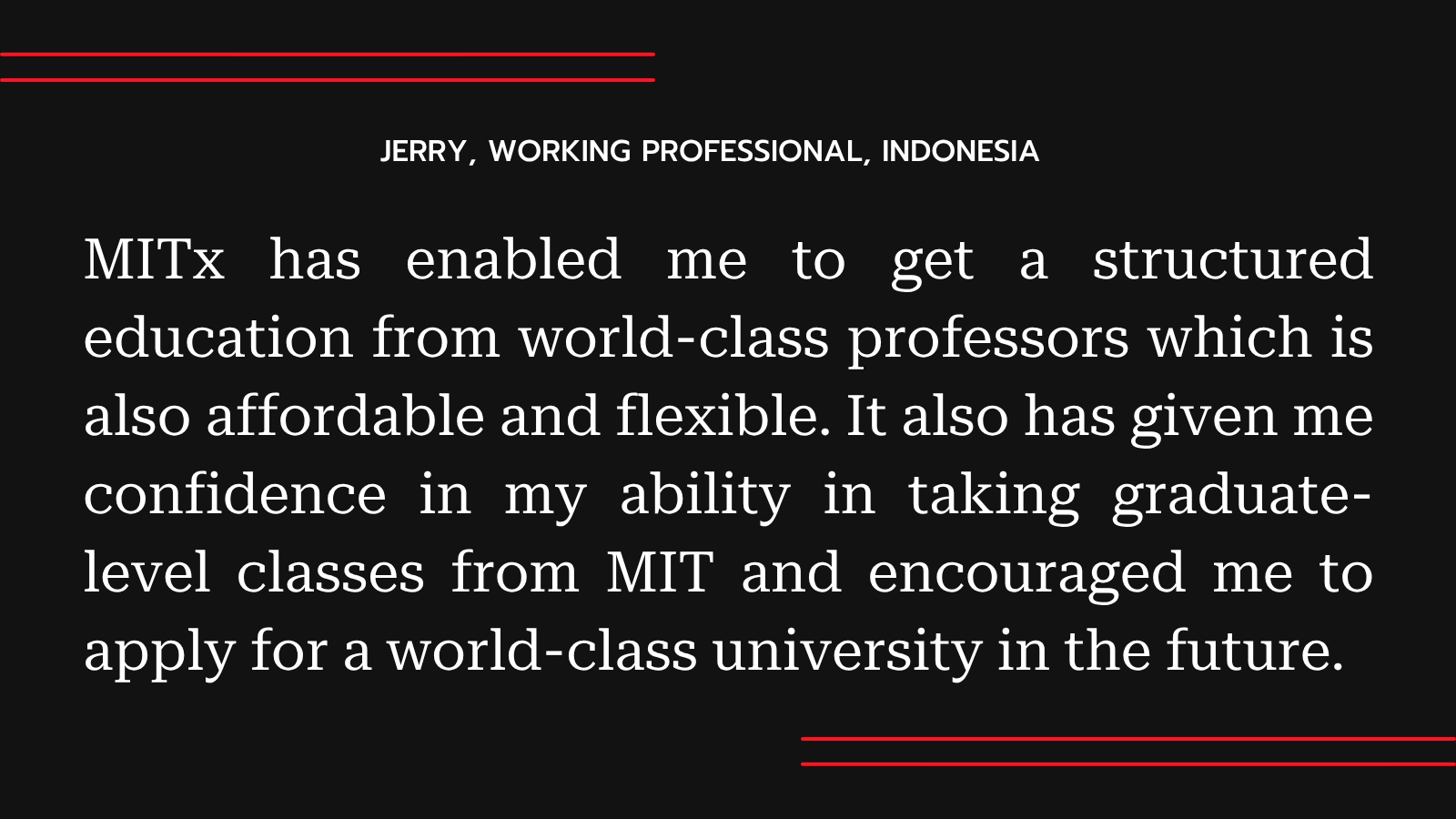 Photo courtesy of Abigael Bamgboye.
Photo courtesy of Abigael Bamgboye.
Kate Stringer | MIT Open Learning
A number of pervasive myths surround online learning: that it’s isolating, that the quality of instruction is innately lower than in an in-person classroom, or that it’s only for those who can’t succeed in traditional educational settings.
Abigael Bamgboye, an accomplished and highly self-motivated university graduate who just completed the MITx MicroMasters Data and Economic Development Policy (DEDP) program, gives the lie to all these myths.
Instead of feeling isolated, Bamgboye connected with communities of learners around the world. Instead of experiencing a watered-down version of graduate studies, she discovered a challenging and rewarding introduction to masters-level work in a field that interests her deeply, and that will help inform her future career. And far from pursuing online study as an alternative to traditional higher education, this recent graduate of Imperial College London’s Materials Science program used her MicroMasters experience to add to her record of high achievement.
The program also helped her reconnect with MIT: Bamgboye spent a semester studying in the Department of Nuclear Science and Engineering in 2019 as part of an academic exchange. Indeed, it was during Bamgboye’s time at MIT that the MicroMasters program first drew her interest. While taking an introduction to international development class at the MIT D-Lab, she was introduced to the work of the Abdul Latif Jameel Poverty Action Lab (J-PAL) and was impressed to find a research center of its scope attached to a university. She was also excited to discover that J-PAL, which houses the DEDP (Data, Economics, and Development Policy) MicroMasters program, could offer her opportunities to stay engaged with MIT after her semester-long exchange had ended. “I thought, ‘Wow, not only is it a fantastic way for me to expand my learning, but it’s something I could potentially do remotely across the school year,’” she says. “Plus, there’s the opportunity to come back to campus and do things there.”
Once enrolled in the DEDP program, Bamgboye immediately realized she had gone up a step in the intensity of her studies, particularly compared to her undergraduate work. “You’re learning so much in a short period of time,” she says. “In a [UK] undergraduate degree, you learn a foundational skill set over two years [before specializing in a third or fourth year], while in the MicroMasters, if you take courses concurrently, you’re potentially learning the foundational skill set over three to six months.”
To Bamgboye’s mind, this intensity is all to the good, helping build learners’ confidence in the skills they’ve acquired: “By the time you get to the proctored exams, where you have to consolidate everything you’ve learned, you surprise yourself. And your understanding is boosted as things fall into place.” She was reminded of the “dense and challenging” MIT course content she encountered during her semester abroad, recalling how a high percentage of PhD students in one of her classes in the nuclear science and engineering department kept her studies rigorous.
A global approach to life and learning
International cooperation is an integral part of Bamgboye’s raison d’être, as are the connections between science and human activity. “As a learner, I’m always curious to understand how the world works, or to gain a new perspective,” she says, noting that she sees “materials and science as a way of understanding the world, similar to the way some people see and use economics.” Her undergraduate major allowed her to combine interests across STEM disciplines, but also to ask far-reaching questions for the future of humankind: “Why do technologies work the way they do? How will they evolve to be more efficient, and less environmentally intensive? How can we use existing knowledge to help people?”
She describes discovering, as an undergraduate, “a passion for working on projects that use data to drive decision-making and ultimately impact people.” A natural communicator and networker, Bamgboye got involved in a variety of clubs and societies that allowed her to connect with those who shared her interests — she participated in Imperial College’s African Caribbean Society, and was elected vice president and eventually president of the school’s Materials Society — and also pursued opportunities to engage with a global audience, joining her school’s chapter of Enactus, an international social entrepreneurship society. While completing a series of internships across a variety of industries including banking, manufacturing engineering, and teaching, she discovered and deepened an overarching interest in organizations that “maximized opportunities for people and communities.”
It’s this commitment to interdisciplinary and cross-cultural cooperation that has inspired her to share her learning journey with others. Bamgboye has distilled wisdom accrued over more than 800 hours of online learning into a YouTube video sharing her keys to success. One of these keys is — unsurprisingly — creating and participating in a community of people who share your learning journey. “Learning is always more fun if you can engage in real-time conversation and ask insightful questions to TAs [teaching assistants], lecturers, and peers,” she says.
Bamgboye also finds ways to use and share her learning as part of her professional life. In her current role as an associate consultant at Bain & Company, she is able to devote 10 percent of her time to projects of her own choosing, focusing on social impact. She volunteers with various UK nonprofit organizations, helping them scale their reach and impact. Thanks to her DEDP training, “I’m already able to offer contextual examples of how different social programs have been able to validate and quantify which of their interventions are the most effective.”
She’s also using her foray into graduate studies as a springboard into new educational opportunities. Bamgboye has been accepted to the University of Pennsylvania’s Wharton Moelis Advanced Access MBA program, a deferred admission scheme that offers both undergraduate and full-time master’s students in their final year of study a guaranteed pathway to the Wharton MBA following two to four years of work experience. While at Wharton, Bamgboye plans to leverage the knowledge and skills gained during the MicroMasters in social-focused ventures.
“Ultimately, there are so many ways that the MicroMasters has enhanced my life,” she says, “from broadening my horizons, to equipping me with new skills, to providing me with the vocabulary and context to participate in conversations and activities that I am interested in.” Most importantly, she describes how completing the program helped her feel ready to tackle any educational or career challenge that comes her way: “Having done the MicroMasters, I now have a level of confidence I wouldn’t otherwise have had.”




